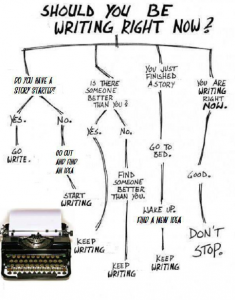As a review and reminder, the strategies I’ve shared so far are #1. Take Time to Get Clear, #2. Read and Research, and #3. Plot Out Your Time Line and Communicate It.
The next strategy is: #4. Have a Personal Action Plan and Prioritize Your Days
Henry Ford said, “Nothing is particularly hard if you divide it into small jobs.”
Once you are clear on your project and have developed timelines and communicated them, break the project down into bite size pieces. Set goals. If you’re writing, decide on a specific word count that you’ll meet each day, or an amount of time you’ll spend each day, week, and/or month. If you’re still reading and researching; plan on a specific amount of time you’ll invest in those activities. Choose how much, how often, and when. And once you make a decision on what to do, stick with it, yet be flexible. Have a plan, but go with the flow.
To counter the feeling of being overwhelmed; again, be flexible. In terms of prioritizing your days, make sure you know what’s most important to be accomplished each day to move your writing project(s) forward. To the extent you have the flexibility, organize your time to support your natural strengths, and accommodate your weaknesses.
If you’re a morning person it might feel like a relief to get the hardest tasks done first thing in the morning. However, if you are more mentally alert in the afternoon, let yourself ease into the day by competing your less demanding tasks first. Then get to the tougher ones once you’re feeling more hardy and clear headed.
Henry Ford put it well when he said, “Most people spend more time and energy going around problems than in trying to solve them.”
Two weeks from now I’ll share some specific ideas on how to physically organize your work. See you then! 🙂






